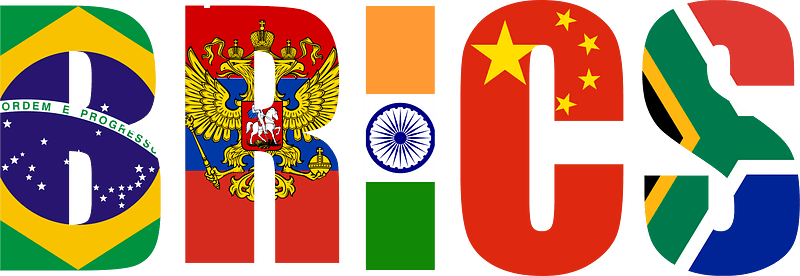Editor's Note (10.24.24): The 16th Annual BRICS Summit has concluded. The world awaits the final communique, sure to offer insight into what developed at the Summit and how the BRICS nations and their allies continue to shape the emerging new world order. IdleGuy.com will continue to report on developments leading from the Summit in the November issue, available online November 1. Prior to that, updates will be posted on this page.
There is a lot that is known about the BRICS, but much - in Western nations - that is not understood about this coalition of major nations as the original combination of Brazil, Russia, India, China and South Africa meet, with notable additions (BRICS+) on October 22-24 in Kazan, Russia for their 16th Annual Summit.
Having added four more full members to its roster at the start of 2024 - Egypt, Ethiopia, Iran, and the United Arab Emirates (UAE) - with Saudi Arabia's membership still pending. the number of official BRICS has nearly doubled the number of official members. There are many more nations - as many as 120 according to some estimates - looking to join the BRICS as partners in trade, education, health, military support and alliances, construction, infrastructure projects and a plethora of other areas of development.
The summit in Kazan will be dynamic and possibly historically monumental as foreign ministers and heads of state from around the world meet to continue forging the BRICS' path toward a multi-polar world.
What has been happening with increasing frequency among BRICS nations and other so-called "friends of BRICS" is trading in local currencies, completely bypassing the dollar in international trade.
Brazil and China jointly trade in their own local currencies. China and Saudi Arabia have established trade in oil for Chinese yuan, supplanting the "petro-dollar" with the "petro-yuan." Russia, the most prominent target of Western hubris, trades with China, India, and a host of other regional countries using the ruble or local currencies for settlement.
In all, 21 nations in BRICS and ASEAN (the Association of Southeast Asian Nations) have agreed to stop using the dollar for cross-border trade. Those nations combined represent well over half the global population and more than half of global GDP.
One interesting development in cross-border trade between China and Russia happened recently, in June, when the United States threatened to sanction banks in China and elsewhere for dealing with Russia. The threat of sanctions had a chilling effect, with payment delays and even cancellation of orders, but crafty Russian businesses found a number of methods to circumvent the West's attempt to restrain them. One method was to buy gold, sell it in Hong Kong and then deposit the cash in a Chinese bank.
Thus, instead of restraining trade between China and Russia, the U.S. and its allies only succeeded in moving the BRICS two largest trading partners that much closer to trading goods for gold. Additionally, more and more leaders of smaller countries and some larger ones have grown wary of the ongoing U.S. sanction regime, which hampers trade and causes more international tension. These countries are aggressively looking at the BRICS as a remedy to Western hegemony and reliance on currencies not their own.
Bilateral trade between Russia and China grew by 1.6% to $137 billion in the first half of 2024, according to China's official customs data, after hitting a record high $240 billion in 2023. The threat of sanctions will slow the growth of trade in the second half according to Chinese sources, but only by a little, roughly three to five percent.
The expanded BRICS are an economic powerhouse, now representing more than 45% of the world's population while accounting for a larger share (nearly 36%) of global GDP than G7 countries (30%) when adjusting for purchasing power parity (PPP).
The BRICS currently boasts 1.6 million individuals with investable assets of over USD 1 million in the grouping of the world's leading emerging economies, including 4,716 centi-millionaires (with more than USD 100 million in investable assets) and 549 billionaires.
According to Henley & Partners investment expert, Jeff D. Opdyke, "nations once considered 'developing' or 'emerging' or the pejorative 'third world' are now dynamic economies that are changing the global order. Economically, non-Western nations - with BRICS at the vanguard - are pushing the globe into a new reality: An emerging economic, social, and monetary status quo that is upending what the world has accepted as normal for nearly eight decades."
On the economic frontier, BRICS established the New Development Bank in 2015 as a counter to the World Bank and the International Monetary Fund (IMF). The bank has funded billions in loans and bonds to develop infrastructure projects around the world, including energy efficiency projects, digital infrastructure, water and sanitation, and environmental protection.
On the agenda for the 16th BRICS Summit are the usual issues of cooperation and mutual respect of trading partners within the BRICS, but also with countries on the periphery which are seen as future full BRICS members. Countries as far-flung as Vietnam, Cambodia, Singapore, Malaysia, Indonesia, Ghana, and even Mexico and Afghanistan have expressed interest in joining BRICS or at least establishing better relations with countries they see as not being a threat to their individual sovereignty, such as the U.S., Europe, England, and Israel routinely enforce economic conditions at the end of the barrel of a gun.
What has the Western nations shaking a bit is the continuing development of a blockchain-based alternative to SWIFT, the Western settlement platform for international trade that banned Russia from participation in 2022.
A story by the Jerusalem Press on September 30, confirmed rumors of a developing alternative payment and settlement system, citing Russian President Vladimir Putin announcing such an endeavor. In collaboration with the Bank of International Settlements (BIS), the BRICS Bridge project has involved a good number of participating countries, including China, the Eurasian Economic Union (EAEU) and the Gulf countries and has so far concluded that preliminary tests have met with success.
BRICS Bridge shares a similar name with mBridge, the cross border central bank digital currency (cross border CBDC) platform developed by four central banks, including BRICS members China, the UAE, and Saudi Arabia, along with Thailand and Hong Kong.
While trade and global alliances will no doubt be top agendas at the summit, the development of a gold-backed, BRICS-wide currency, known in passing as the "Unit" will be a hot topic. According to most informed sources, the currency would be at least partially backed by gold, perhaps at 40%, the remaining 60% tied to a basket of BRICS' members national currencies. While the establishment of the "Unit" is probably still years away, it may become reality as early as 2030, a change that would shake the foundations of Western banking to its core.
While Western media continues to try to downplay the importance of BRICS on the global stage, it's becoming more and more apparent that these countries mean business and most are fed up with the dominance of the U.S., Europe and their allies. For their part, diplomats in the U.S., the EU, and Britain attempt to denigrate the plans of the BRICS and continue to threaten them with sanctions and war, rather than acting in an adult manner with cooperation, compassion, and dignity.
At some point, the attitudes of Western diplomats will foment more ill feelings from the rest of the world, and, unfortunately, the effects of their insouciance and hubris will be felt mostly by their citizens, who will suffer loss of liberties and economic advancement. From the looks of things, leaders in the U.S. and Europe had best not toy with BRICS and instead seek ways to align more closely with the rest of the world instead of threatening its existence.
Perhaps the election of Donald Trump to a second term will prove a turning point in U.S. relations with the BRICS, though judging by his pre-announcement of tariffs, it still seems a long way off.
 16th Annual Summit this month in Russia could be historic
16th Annual Summit this month in Russia could be historic
|
|||
| search engine by freefind |
BRICS 2024: BRICS Blockchain, New Financial System & Currency, Expansion, mBRIDGE | Lena Petrova
BRICS Summit: Marching towards a new world order
Putin: BRICS to make 'important decisions in Kazan
Lena Petrova Reports on Developments at the Opening of the BRICS Summit
Felix Richter: Global Clout of the New BRICS
Resources:
The Duran
Worldometers
Simplicus the Thinker
Global South
World Affairs in Context

Your ad could be in the next issue of idleguy.com for as little as $6 per month. Contact Fearless Rick using the form on page 12 for more information.
